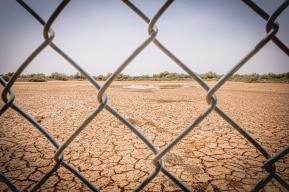Kelvin Nyangweso’s day starts at 5.30AM every morning when he makes his daily commute to Dagoretti, a suburban area Southwest of Nairobi where he grew up, and where he now runs a community radio station, Mtaani Radio.
Like 150,000 other Dagorettian morning listeners, he begins his day with Amka Na Mtaa (‘Wake Up with Mtaa’), the stations’ morning show that runs from 5.00AM. The familiar sounds accompany him on the way to work—the recorded gospel, the morning news, the voice of Kamadi (his colleague and morning talk show host)—and help him ensure that things are already up and running at Mtaani.
By 7.00AM, Kelvin is in the studio, and the day begins in full swing. It is taking a slightly different course today, as Kelvin welcomes us into his office to speak about UNESCO’s Social Media 4 Peace Project, funded by the European Union, and how community radios in Kenya are crafting educational programmes in local languages to strengthen community resilience to dis/misinformation and hate speech online.
In addition to being the founder and station manager of Mtaani Radio, Kelvin is also the Chairperson and founder of the Association of Kenyan Community Media Operators (AKCMO).
Radio’s Role in the Community
Mtaani Radio was established in 2014 to address what Kelvin saw as a gap between his community in Dagoretti, the rest of country and the world.
“Documentaries were being made about the slums in Dagoretti, but instead of screening them to the community members whose stories it presumed to tell, they were only showed outside of Kenya," recalls Kelvin. "So we thought: how can we come up with a radio station that will serve as the voice of the people, by the people?”
Community radios differ from commercial radios in their ownership, programming and reach. It is owned by the local community, co-created with the community, and its range is typically limited to a small geographical area where the community resides.
“Mtaani means community,” Kelvin explains, “because it originated from the community”. The radio’s core programmes are designed and decided upon together with Dagoretti’s community members. Kelvin’s team surveys the neighbourhood to seek feedback on topics that are of interest to the community. Hot-button issues typically include health, education, drug abuse, youth unemployment and teenage pregnancy.
This feedback is then used to curate content that provides solutions for issues frequently faced by low-income neighborhoods, typically by leveraging on the skills and wisdom of community members themselves. Key community leaders are regularly brought on air to provide advice or open conversations with listeners.
One such listener-turned-host is Sharon Mbilika, a Machakos-native who has lived in Dagoretti for 13 years. “She used to call in very often, so we invited her to come on board,” explains Kamadi Amata, Mtaani’s editor. In addition to regular house visits and health check-ups in the community, Sharon usually gives radio health talks on Thursdays, covering topics from youth drug abuse to early pregnancies.
“I can see how I’m able to change people’s lives and give them self-esteem and courage, especially around scary topics like early pregnancies or testing for HIV,” she explains. “They are no longer fearful, but have hope.”
As a professional counselor, Sharon has also helped to mediate conflicts between couples and provides advice to women and girls on gender-specific issues.
“Everything about Mtaani Radio is good,” she adds, “more and more people are getting useful information from the radio, and the presenters work hard to make sure everyone in our community is well.”
Online to On Air: Community Radios in the Fight Against Online Harmful Content
Since 2014 but more so in recent years, Mtaani Radio has noticed an uptick in concern among Dagoretti’s residents regarding “unverified” rumours which have the potential to cause harm within their community. Although misinformation, disinformation and hate speech have always existed in Kenya, which has historically struggled with hate-speech incited electoral violence, the advent of digital platforms has accentuated the volume, velocity and virality of their spread.
During Kenya’s 2013 and 2017 elections, Kelvin witnessed how online hate speech, disinformation and divisive identity politics led to offline violence, especially in urban informal settlements. While Dagoretti remained relatively peaceful during these periods of tension, other areas were not so lucky.
To address these threats, Mtaani Radio also runs a fact-checking desk to verify potentially false rumors circulating in the community. Listeners can call in to report a piece of information for the radio team to fact-check. Mtaani then updates its findings—confirming or dispelling the information—on air and via its online social media platforms.
Communal peace is especially crucial in a highly cosmopolitan community like Dagoretti. While it was formally largely inhabited by the Masai and Kikuyu tribes, the area’s population grew and diversified when refugees from Rwanda, Sierra Leone, and the Democratic Republic of Congo among others moved into Nairobi’s suburbs following UN and government refugee settlement schemes throughout the 2000s. According to Kelvin, Dagoretti’s relative peace after the 2007 election-related ethnic violence also drew new settlers, and the population expanded from 250,000 to nearly half a million within six years.
Such a diverse make-up is part of the community’s strength, but it also produces the risk of communal tensions. Bad actors may leverage on identity politics to seed suspicion and discontent between groups.
“Mtaani Radio works with security agencies and community leaders to disseminate truthful information and maintain peace within the communities,” Kelvin describes, “but faced with the volume and growth on online disinformation and hate speech, we have to empower community members to fact-check and spread truthful narratives themselves too.”
What distinguishes the campaign from previous programmes is its emphasis on delivering content to communities in their local language in a context-sensitive manner. Through AKCMO, community radio stations came together to brainstorm and disseminate catchy and easily understandable messages and graphics through social media. Talk shows about the challenges of hate speech and mis/disinformation online were hosted between Commissioners from the National Commission for Integration and Cohesion (NCIC) and Representatives from the National Council for Persons with Disabilities (NCPWD) by community radios across Kenya.
In addition to mainstreaming inclusivity, the conversations were broadcasted in a variety of languages spoken widely by local communities, such as Masai by Radio Domus, Swahili by Ruben FM and Mtaani Radio, as well as Dholuo by Jowi FM and Dada Radio in Western Kenya.
Today, Kelvin continues to lead the campaign as the Chairperson of AKCMO and a member of the National Coalition on Freedom of Expression and Content Moderation in Kenya (FECoMo), a body established under the Social Media 4 Peace project, which brings together various national stakeholders to innovate locally-contextualized solutions to address online harmful content.
At the end of our conversation, he limps out of the door as he ushers us from his office, nursing a sprained ankle. It is an unfortunate outcome of a tournament he had been organizing for the youth in the community over the weekend. “It was just a collision with an opponent,” Kelvin recalls, still laughing. Work with the radio must carry on.
Outside, we find a group of boys on the basketball court playing football in Mtaani’s complex, which houses other public services and civil society organisations, including a children’s department, medical dispensary, international rescue center for refugees, a social hall, a small school, and an artisanal shop where locals can sell their works at fair trade prices. It is a vibrant and cozy space that reflects a wider ecosystem that the community radio is embedded in, and which it works with to foster peace and resilience in Dagoretti.
Community radios have played a very big role in ensuring communities stay at peace, especially during difficult moments. They exist in the biggest informal settlements here in Nairobi and Kenya. We mobilize community networks and leaders, create spaces for diverse opinions and conversations to be had about key issues to the community, and share information directly with the community. We work and live in the very communities we serve.
Funded by the EU, UNESCOs ‘Social Media 4 Peace’ project seeks to strengthen the resilience of civil society to potentially harmful content spread online, while protecting freedom of expression and contributing to the promotion of peace through digital technologies. In Kenya, UNESCO works with a variety of networks and partners from regulators to community media to transform the digital ecosystem into one that is safe and empowering for all.





